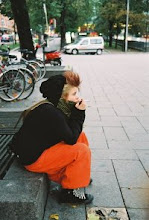Wednesday, July 16, 2008
Stories from the army
Missing mother...
Food = Gasoline
Escape!
A little something about my grandfather and happenings in his life.
When he was young, my grandfather went to school at Päärdu manor and after reaching the age of 16 and having finished 8 grades he went on to become a furniture-maker at Tallinn Industrial School, because at that time the only other option was to become a collective farmer, especially because his father was herd brigade leader at the local collective. Noone wanted to become a collective farmer, so he tried to avoid by all means. After finishing his studies they wanted to recruit him straight away in May, so they could hold him there for the whole summer without official record, so he never signed the document stating he had received his recruitment papers and went back to Vigala to his father to spend the summer there and eventually left on 9th September. This was in 1952.
Monday, February 11, 2008
Minu esimene postitus vanaisa kohta.
Läksin siis ühel pühapäeval ema isa, minu vanaisa Eberhardi juurde Raplasse külla. Praegu elab ta koos vanaema Ellega viljandi maanteel, kuhu kolis peale seda kui abiellus vanaemaga Kabalas, kuhu ta peale Vene sõjaväest vabanemist 1956 või 1957 läks, sest ta ema Aliide tädi ja tolle mees kutsusid teda. Kõigepealt sai ta seal Rahvamaja juhatajaks ja jäi sinna ühte korterisse elama. Tutvus siis vanaema Ellega ja 1962 nad abiellusidki ning mõni aeg peale seda kolisid oma praegusesse koju.
Lapsepõlves elas ta ema, õe Erna, venna Egoni ja isa Aaduga Vigalas, neil oli oma talu ja oma pood(Manni pood), poe eest hoolitses ema ja isa hoole all oli talu. Neil oli 24 hektarit maad, neil olid lehmad, hobused, kanad ja LAMBAD, aga kui tuli kolhoosiaeg siis oli nende omand ainult 0,6 hektarit maad. Vanaisa isal olid iga kahe nädala tagant jubedad peavalud ja vanaisa ema oli südamehaige.
Esimene lugu, mis mul meelde tuleb on see kui mu vanaisa oli kuskil 6/7 aastane ja hakkas teine maailmasõda. Saksa luurelennuk lendas Vigala kohal ning kui Venelased teada said hakati siis seda lennukit pommitama ning vanaisa mäletab, et üks pomm lendas Manni kõrtsi juurde ja järgmine pomm lendas nende õuele, keegi küünis olev inimene nägi seda ja jooksis tuppa teistele ütlema ja siis pomm plahvatas, aga maja jäi terveks sest killud lendasid küll igale poole ja mulda pritsis aga pomm oli majast liiga kaugel et sellele liiga teha. Niisiis õnneseened.
Väiksena käis vanaisa Päärdu mõisas koolis ja peale seda kui ta oli 16 aasta vanune ja lõpetanud 8 klassi läks ta Tallinnasse Tööstuskooli tisleriks õppima, kuna tollel ajal oleks ta muidu pidanud kolhoosnikuks hakkama, eriti veel arvestades seda et ta isa oli kolhoosis karja brigadir. Kolhoosnikuks ei tahtnud keegi saada, seega üritas ta seda iga hinna eest vältida. Peale tööstuskooli lõpetamist taheti teda kohe mais sõjaväkke võtta, nii et ta oleks pidanud terve suve seal olema ja seda poleks arvestatud, seega ei kirjutanud ta kutse kättesaamise kinnitusele alla ja läks isa juurde vigalasse tagasi, et terve suvi seal veeta ja siis alles 9. septembril minna, see oli aastal 1952.







